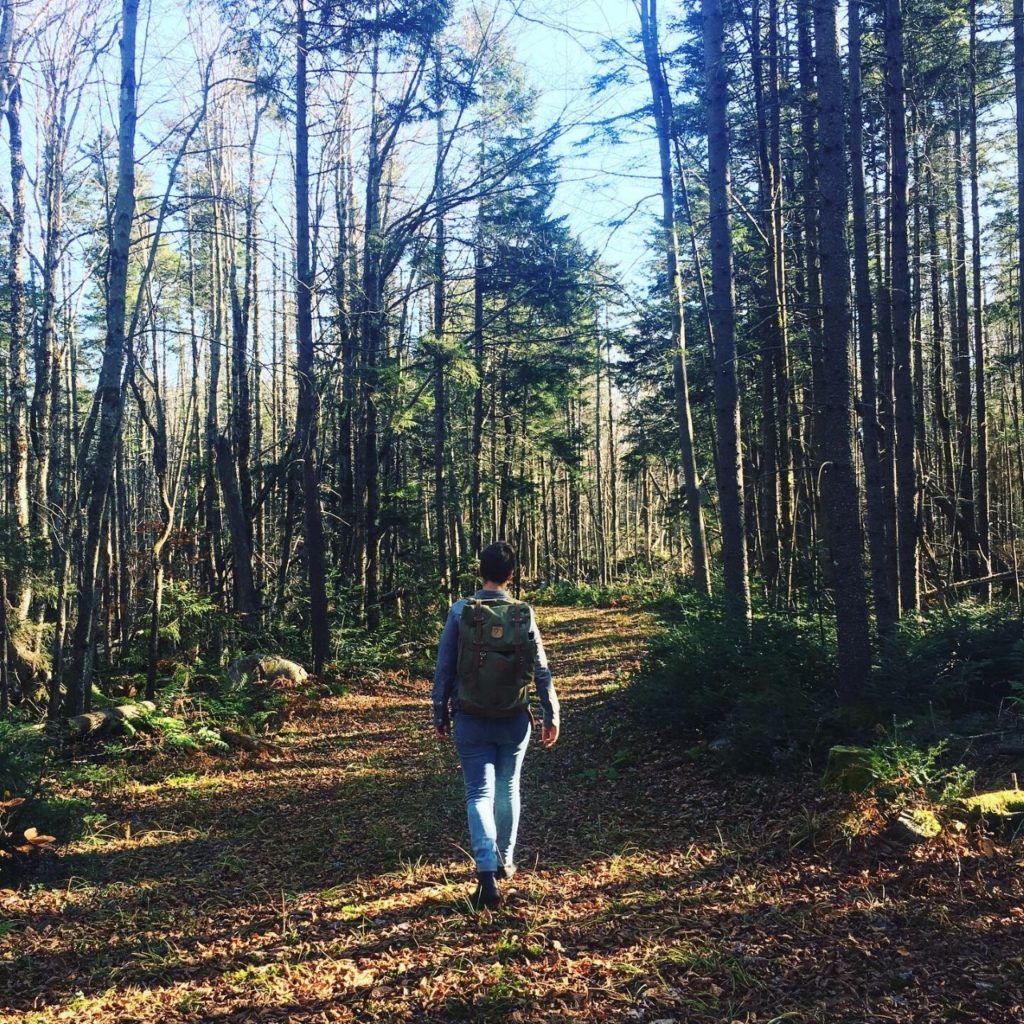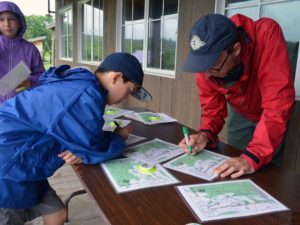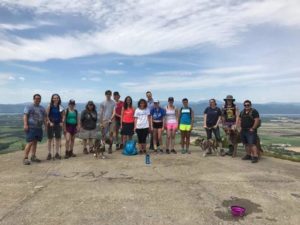This post was written by Lettie Stratton, founder of Wild Wanderer, an online community promoting outdoor activity (including hiking, biking, gear reviews, and more) for those in the LGBTQIA+ community. Follow the adventures on Instagram.

I grew up hiking, backpacking, and camping in Vermont. The outdoors has always been a big part of my life, with nature being a place of refuge and rejuvenation. So many LGBTQ+ people, myself included, go into nature to escape the stresses, worries, and confines of everyday life. Most of the time it works really well, but sometimes it doesn’t.
Encountering homophobia on the trail can be particularly scary. Sometimes a rude comment or a lingering stare can leave you wondering if you’re safe or welcome on the trail. The good news is a bit of planning can go a long way towards protecting your safety when you’re a member of the LGBTQ+ community or hold other marginalized identities.
I started Wild Wanderer, a site and community for LGBTQ+ outdoor adventurers, because it’s so important for everyone to feel safe, welcome, and joyful in the outdoors. I want LGBTQ+ people to be able to see other queer people doing amazing things outside, to find community, and to have access to helpful resources that enable them to enjoy the moment and be present on the trail without any of the stress or fear.
Never should you feel afraid of being too “visibly queer,” holding hands with a partner, or expressing your whole self while hiking. For those members of the LGBTQ+ community just starting out or just getting curious about hiking and the outdoors, there are a few things you can do pre-hike to ensure you feel safe and prepared for situations you may encounter.
Don’t skimp on safety
Let’s start with the basics. When you leave for a hike, the best practice is to tell someone where you’re going and when you expect to be back. Always sign-in at the trailhead if you have the opportunity to do so.
It’s always a good idea to have a way to call for help if you need it, so carry a cell phone even if you prefer to unplug while outdoors. Of course, in many remote areas cell service is unreliable or non-existent, so a satellite communicator like a Garmin InReach may also be useful.
 Trip planning basics like bringing a map, preparing for adverse weather conditions, and always carrying plenty of water and a snack apply here, too. In Vermont, the saying goes that you can experience five seasons in one day – spring, summer, fall, winter, and – of course – mud season. You might encounter bears, black flies, hunters, or surprise snow storms, so you should be prepared for any scenario.
Trip planning basics like bringing a map, preparing for adverse weather conditions, and always carrying plenty of water and a snack apply here, too. In Vermont, the saying goes that you can experience five seasons in one day – spring, summer, fall, winter, and – of course – mud season. You might encounter bears, black flies, hunters, or surprise snow storms, so you should be prepared for any scenario.
In my experience, other people on the trail are kind and helpful nine times out of ten, but it never hurts to be prepared and self-sufficient. That way, if you find yourself alone or around folks who are unable or unwilling to help, you’ll be prepared enough to help yourself and others.
Research Your Destination
If you’re planning to hike in an area that’s unfamiliar, it’s a good idea to research your destination. Luckily for hikers in Vermont, the Green Mountain State often tops lists of the most queer-friendly places in the United States.
Nevertheless, ask yourself these questions: Is it a queer-friendly state/town/trail? Are there any nearby areas you need to avoid? Know what amenities are nearby and where you feel comfortable stopping to rest or refuel. Forums and social media groups can be great places to find information about other people’s experiences and suggestions.
You can also join the Wild Wanderer community to connect with people who are willing to share their experiences from trails and trips all over the world. There’s certainly no shortage of queer hikers in Vermont who are willing to answer questions and give tips to other LGBTQ+ hikers and adventurers.
Talk It Out
Having a plan for how to handle certain situations can help you feel more confident on the trail. If you’re hiking with a group, it’s even more important to be on the same page. Communicate to each other what you feel comfortable sharing about your identity with people you encounter on the trail.
If there are other queer people in your group, ask them the same question. How do you want to handle things if you encounter homophobia? If someone misgenders you on the trail, how can your peers best support you?
This is everyone’s individual choice, so being on the same page with your group before you head out always makes it easier to feel safe and supported. Consider using a safe word in your group that can be said if someone feels unsafe or uncomfortable in the presence of someone you meet on the trail.
Anyone you’re hiking with, whether they’re part of the queer community or not, has the opportunity to be an ally on the trail. While one LGBTQ+ person might be out and proud on the trail, another might prefer to fly under the radar, so it’s important for allies to listen to everyone’s individual voice and preferences. There’s no wrong way to be queer outside.
Seek Out Community
Lots of LGBTQ+ hikers feel safer (and have more fun!) when hiking with a group of other queer people. There are a number of great LGBTQ+ outdoor adventure groups that can bring an often much-needed sense of community to beginner queer hikers – and experts, too.

Search for “queer hiking groups near me” or check out organizations like The Venture Out Project, QPOC Hikers, and Get Out and Trek for support, community, and resources. In Vermont, Audubon Vermont has been hosting Pride Hikes since 2018, which have been a welcome environment for LGBTQ+ Vermonters to connect with their community. There are tons of other LGBTQ+ hikers and adventurers out there waiting to connect – you just have to look for them!
It is my hope that all trail users will feel safe and welcome recreating outdoors, no matter their experience level or identity. But homophobia does exist on the trail, and hopefully these tips help ease your mind and allow you to fully enjoy your hike and the magic that comes from being in nature.



















As somebody who often encounters the “lingering stares” you mentioned, I appreciate this article very much, thank you!
Super article, really appreciate this!